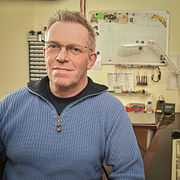Werner Koch
| Werner Koch | |
|---|---|
|
Portrait of Werner Koch in January 2015. | |
| Born | July 11, 1961 |
| Residence | Düsseldorf, Germany |
| Nationality | German |
| Occupation | Software developer |
| Known for | GNU Privacy Guard |
| Website | |
|
werner | |
Werner Koch (born July 11, 1961) is a German free software developer.[1] He is best known as the principal author of the GNU Privacy Guard (GnuPG or GPG).[2] He was also Head of Office and German Vice-Chancellor of the Free Software Foundation Europe.
Life and work
Koch lives in Erkrath, near Düsseldorf, Germany. He began writing GNU Privacy Guard in 1997, inspired by attending a talk by Richard Stallman who made a call for someone to write a replacement for Phil Zimmermann's Pretty Good Privacy (PGP) which was subject to U.S. export restrictions.[2] The first release of GNU Privacy Guard was in 1999 and it went on to became the basis for most of the popular email encryption programs: GPGTools, Enigmail, and Koch's own Gpg4win, the primary free encryption program for Microsoft Windows.[2]
In 1999 Koch, via the German Unix User Group which he served on the board of,[2] received a grant of 318,000 marks (about $170,000 US) from the German Federal Ministry of Economics and Technology to make GPG compatible with Microsoft Windows.[1] In 2005 he received a contract from the German government to support the development of S/MIME. In 2015 he was awarded a one-time grant of $60,000 US from the Linux Foundation's Core Infrastructure Initiative.[3] Also in 2015 Facebook and Stripe each pledged to annually donate $50,000 US to GPG development.[2][3]
References
- ↑ 1.0 1.1 Wayner, Peter (November 19, 1999). "Germany Awards Grant for Encryption". The New York Times. Retrieved February 6, 2015.
- ↑ 2.0 2.1 2.2 2.3 2.4 Angwin, Julia (February 5, 2015). "The World’s Email Encryption Software Relies on One Guy, Who is Going Broke". ProPublica. Retrieved February 6, 2015.
- ↑ 3.0 3.1 Thomson, Iain (February 5, 2015). "Internet lobs $$$s at dev of crucial GPG tool after he runs short of cash". The Register. Retrieved February 6, 2015.
